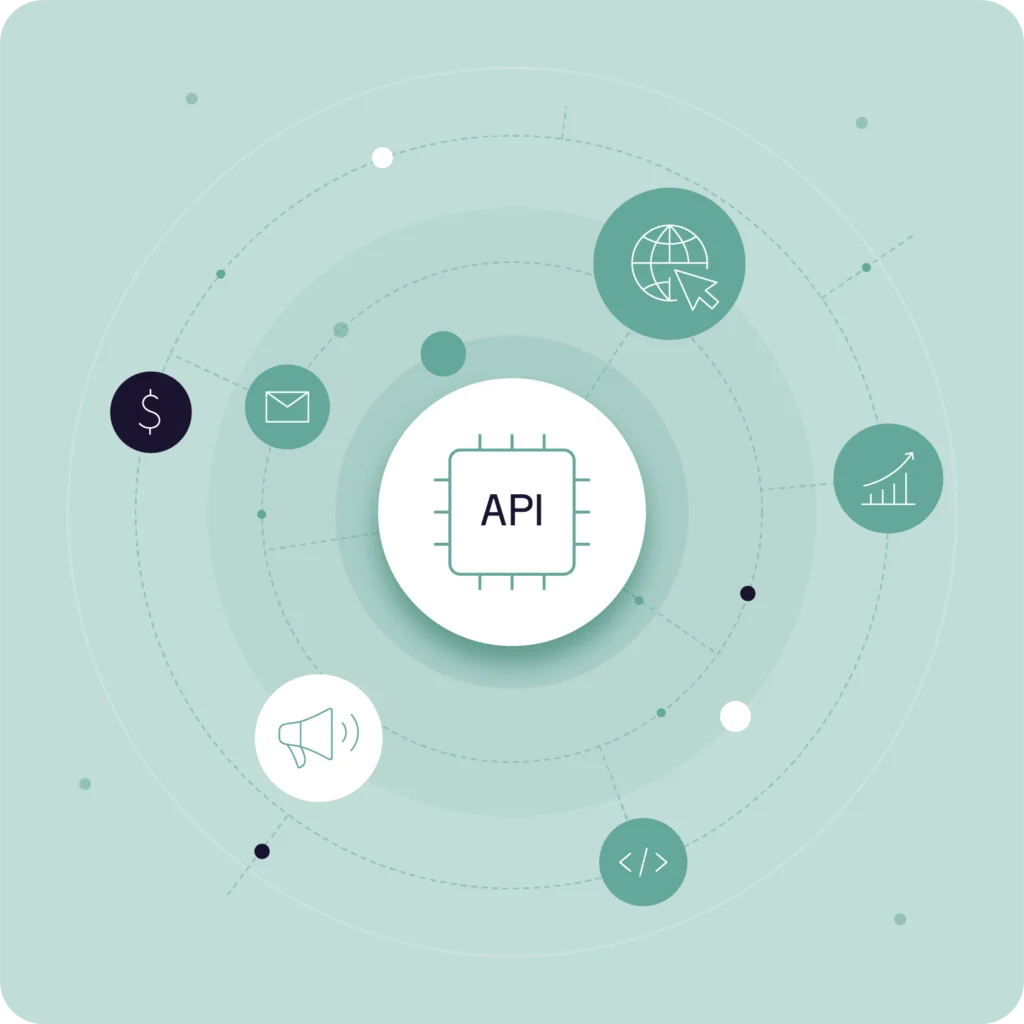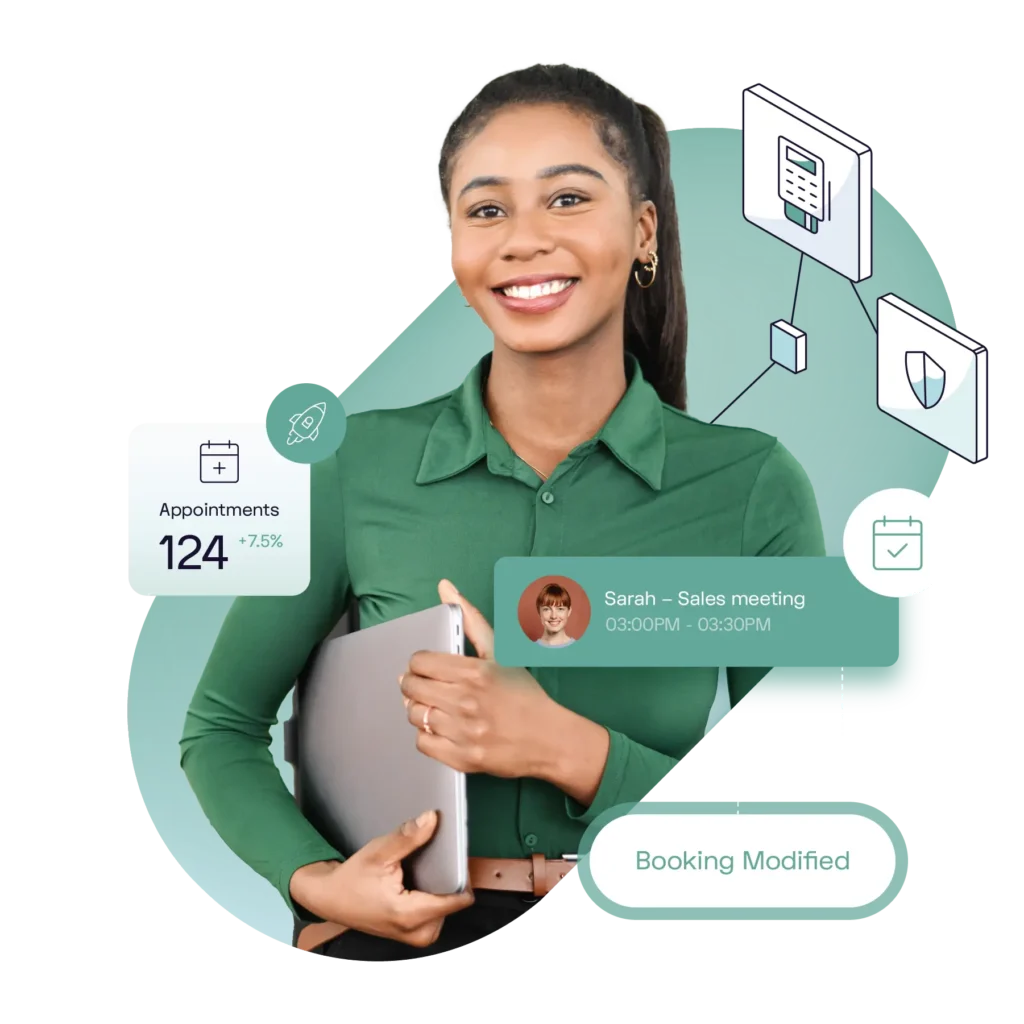In today’s fast-paced, service-driven world, manual appointment booking just doesn’t cut it. That’s where a scheduling API comes in…
So, don’t fall short. An appointment scheduling API is a powerful tool that integrates directly with your business systems to automate and improve how you book, manage, and track appointments. Scheduling APIs integrate seamlessly with calendars, CRMs, and other business platforms, helping elevate internal workflows, customer satisfaction, and overall efficiency.
Defining a Scheduling
API for Your Business
What is a scheduling API? A scheduling API (Application Programming Interface) is an automated tool that allows software applications to communicate and share scheduling capabilities. Specifically, this API helps businesses embed appointment functionality directly into their existing platforms—customer portals, mobile apps, or internal software systems.
A scheduling API can enable seamless appointment booking, client management, and real-time updates across systems within enterprise companies. You gain complete control over how appointments are created, updated, and tracked, all while ensuring a customizable experience for both your team and your clients.
Scheduling APIs are essential for customizing the appointment process to suit specific business needs. From initial booking to real-time updates, everything can be automated and tailored for convenience. This is particularly valuable for businesses that rely on recurring appointments, time-sensitive services, or multi-step client journeys.
How Do Appointment
Scheduling APIs Work?
At a very basic level, appointment scheduling APIs work by connecting a company’s scheduling platform with its other digital tools and databases. The booking process typically begins when a business sets up its staff schedules and availability parameters, defining things such as:
- Appointment types
- Employee schedules
- Location-based preferences
- Working hours

Customers can then see this information directly on the appointment scheduling platform to easily select available slots and book appointments. In many cases, scheduling APIs allow for prepayment during the booking process and provide the option to create a profile so customers can seamlessly review appointment details, book again in the future, and update contact information.
The integration doesn’t just stop at booking—both the business and customer receive instant notifications when appointments are scheduled, modified, or canceled. This constant two-way communication reduces the chance of no-shows and ensures everyone stays on the same page.
By automating the behind-the-scenes logistics, scheduling APIs remove the need for manual coordination. This not only saves time but also significantly reduces scheduling errors.
How Do Businesses Use Appointment Scheduling APIs?
Appointment scheduling APIs are incredibly versatile and offer solutions for a wide range of industries—from healthcare and government agencies to automotive services, education, and enterprise-level organizations. Let’s take a look at some of the most common ways businesses put these appointment APIs to work:
Client Appointment Self-Booking
One of the most powerful features of a scheduling API is allowing clients to book or reschedule their own appointments. This self-service approach eliminates the need for staff to manually handle bookings, reducing the risk of double-booking and freeing up team members for more strategic tasks.
Automated Appointment Reminders
Scheduling APIs also make it easy to send automated reminders, confirmation messages, and follow-up notifications. These updates help keep clients informed and significantly reduce the number of missed appointments and lost revenue, improving overall client engagement and reliability.
Employee Scheduling
For organizations with multiple staff members, scheduling APIs allow for internal calendar management by assigning appointments to specific employees based on skill set, location, or availability. This streamlines operations and keeps everyone organized.
Calendar Syncing
Scheduling APIs can sync with tools like Google Calendar, Microsoft Outlook, or Apple Calendar, ensuring that appointments booked through your business’s platform are reflected in users’ personal calendars, minimizing conflicts and maximizing visibility.
CRM Integrations
When integrated with customer relationship management (CRM) systems, scheduling APIs enhance the user experience by allowing appointment data to update client profiles automatically, which supports better client interactions, targeted marketing, and personalized follow-ups.
Analytics and Reporting
Most advanced scheduling APIs support analytics and reporting features. They track important data such as peak booking times, customer behavior trends, appointment volume, and more. Data is typically provided in formats like JSON or XML for easy integration and analysis, helping businesses make smarter, data-informed decisions.
Benefits of Using Scheduling Software with an API
Using high-quality scheduling software, with a scheduling API, makes appointment management easier, smarter, and more scalable:
Enhanced Customization
Tailor the booking experience to your unique needs, from branding to workflows to data collection.
Improved Scheduling Efficiency
Eliminate the back-and-forth of booking coordination and minimize the chance of errors or double-bookings.
Real-time Updates
Instant alerts keep both businesses and clients in sync, even when appointments change unexpectedly.
Seamless Integration
Easily connect your scheduling tool with CRMs, calendars, billing systems, and other business platforms.
These benefits ease the scheduling burden for both clients and internal teams, promoting smoother operations and a better overall experience.
Improve Schedulingwith DaySmart Appointments’ Powerful Scheduling API
If you’re looking for a powerful, cloud-based solution to elevate your scheduling capabilities, DaySmart Appointments offers a standout API that’s designed with enterprise needs in mind.

With seamless integration capabilities, robust customization features, and support for real-time data syncing, DaySmart’s scheduling API is ideal for businesses that want to scale without sacrificing personalization or efficiency.
From client booking to backend reporting, DaySmart Appointments’ API gives you the tools to modernize how you manage appointments, freeing up your team to focus on delivering excellent service. Whether you’re a service-based small business or a large enterprise, the scheduling upgrade can transform your workflow and client experience.
Ready to see it in action? Try a free demo today and discover how DaySmart Appointments’ API can better your business.

